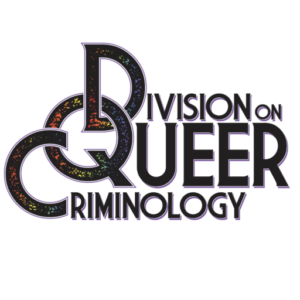Division on Queer Criminology
Message of Support from the DQC Executive Board
February 17, 2025
To our beloved community members,
The DQC would like to affirm our commitment to supporting the work that our members do to illuminate the experiences of LGBTQ+ people, particularly their experiences with the criminal legal system, crime, and justice. The DQC was formed in order to create a cohesive and inclusive space for queer criminologists seeking disciplinary belonging. Our members need and deserve to be seen, heard, validated, and embraced. The work we do is made more difficult by the current U.S. federal government’s blatant attacks on—and attempts to further criminalize—LGBTQ+ identities, which constitute part of a worldwide backlash against queer and trans rights and personhood. The DQC’s Executive Board would like to remind each and every one of you that ours is an inclusive community that values diversity and works towards equity for LGBTQ+ people.
We stand with you and with each other. We are here for you.
Aimee Wodda, Division Chair
Stacie Merken, Vice Chair
Max Osborn, Secretary/Treasurer
Susana Avalos, Executive Counselor
Emily Lenning, Executive Counselor
Vanessa Panfil, Executive Counselor
- DQC Statement on Trans Inclusivity
The Division on Queer Criminology (DQC) Formal Statement on Trans Inclusivity
The DQC is a trans, non-binary, and gender diverse-inclusive organization. We value, support, and stand in solidarity with those who experience negativity, harassment, threats, discrimination, and violence associated with their gender identities. We do not tolerate transphobic hate speech nor anti-trans legislation. Furthermore, we reject sexism, racism, heterosexism, bigotry, or any oppressive speech grounded in social class, disability, age, gender identity, education, sexuality, rurality, or religiosity. We are dedicated to dismantling heterosexism, transphobia, white supremacy, white nationalism, and racism within our scholarship, our universities, our classrooms, and our communities.
We are aware of recent and continued trans-exclusionary writings, including those that claim to be “feminist,” and we do not support the publication of such works. We wholeheartedly reject any writings that contend sex or gender are wholly grounded in anatomy and we reject arguments that adopt essentialist ways of understanding these ideas. We do not wish to further engage with such oppressive narratives or provide a platform for them. We believe in a feminism that is inclusive of trans, non-binary, and gender diverse people and upholds and supports our/their gender identities. Following the work of feminists who experience multiple layers of marginalization across gender, race/ethnicity, class, and sexuality, we recognize that oppressions emerge from a multiplicity of factors rather than a singular point of origin, and our purpose is to attend to, and end, the unsettling social, political, and economic circumstances that produce and perpetuate these oppressions. Through our collective works, the DQC connects researchers with policymakers in order to make meaningful change with and for trans, non-binary, and gender diverse people and communities.
The DQC recognizes both gender and sex as complex and evolving social constructs: neither are binary. We reject biological determinism and gender essentialism. We situate ourselves as a space of support when anti-trans types of thinking are made public or published. We understand the pain and hurt that is caused by these forms of academic and other public discourse. We do not support assertions that are based on harmful, unsubstantiated claims, and/or stereotypes that have been mobilized in political discourse to overtly or covertly harm trans, non-binary, and gender diverse people and communities by excluding us/them from protections granted to cisgender people. We believe that policies and legal statutes focusing on sex-based discrimination should be inclusive of gender identities. We align with the 2020 U.S. Supreme Court ruling that the Civil Rights Act of 1964, which prohibits sex discrimination, is inclusive of sex, sexual orientation, and gender identity as protected statuses.
The DQC stands in unity and solidarity as an advocate for the necessity of increasing protections and consideration for all groups who have been systematically oppressed. We believe in the value of striving for inclusivity, care, and protection for society’s most vulnerable populations.
As an organization, we make the following commitments to overcoming harms toward trans, non-binary, and gender diverse people:
- To reaffirm at all our gatherings and events that our spaces are safe spaces for trans, non-binary, and gender diverse people
- To actively exclude speakers/groups who delegitimate trans, non-binary, and gender diverse people from any of our events and from our organization
- To raise awareness about how institutional harm, structural marginalization, and violence disproportionately affect trans individuals (and in particular, Black trans women and other trans women of color)
- To work with trans, non-binary, and gender diverse people to convene events specifically focused on securing our/their social, economic, political, and cultural justice
Trans rights are human rights.
Further reading: TERF Wars: Feminism and the fight for transgender futures, Sociological Review, Volume 68, Issue 4, 2020.
- What is Queer Criminology?
“Queer criminology is a theoretical and practical approach that seeks to highlight and draw attention to the stigmatization, the criminalization, and in many ways the rejection of the Queer community, which is to say the LGBTQ (lesbian, gay, bisexual, transgender, and queer) population, as both victims and offenders, by academe and the criminal legal system”
~Carrie L. Buist and Emily Lenning, Queer Criminology
__________________________________________________________________________________
On Racial Inequity & Black Lives Matter
The Division on Queer Criminology is committed to the Black Lives Matter movement. We recognize and denounce the history of systemic oppression based in White supremacy and the racialized violence that continues to harm Black, Indigenous, and other people of color that occurs in the criminal justice system, in academia, and elsewhere. We stand in solidarity with those who experience such inequities and those who seek to hear the voices of Black, Indigenous, and other people of color.
